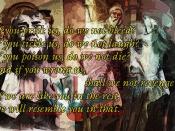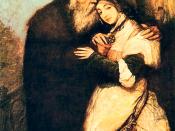In Susan Pharr's "The Common Elements of Oppression", she defines "the other" as the outcast of society, the ones who stand up for what they believe in, no matter how 'against the grain' it may be, the ones who try the hardest to earn acceptance, yet never receive it. In Shakespeare's "Merchant of Venice", Shylock, the 'villain' is portrayed as the other simply because of his faith, because he is Jewish in a predominantly Christian society.
One way that Shylock is classified as the other was by being stripped of his name. Throughout the play, Shylock was very seldom referred to by name; in the trial scene, the Duke identifies him by name twice, and Portia does so once. During the rest of the play, Shylock is usually referred to as "the Jew", "dog Jew" (II, viii, 14), and "currish Jew" (IV, i, 292)
Throughout the play, Shylock was often reduced to something other than Human.
In many cases, even the simple title of "Jew" was stripped away, and Shylock was not a man, but an animal. For example, Gratiano curses Shylock with "O, be thou damned, inexecrable dog!" (IV, i, 128) whose "currish spirit govern'd a wolf" (IV, i, 133-134) and whose "desires are wolvish, bloody, starved, and ravenous" (IV, i, 137-138). Or when Shylock is neither a man nor an animal, he becomes "a stony adversary, inhuman wretch" (IV, i, 4-5). When the Christians applied these labels to Shylock, they effectively stripped him of his humanity, of his religious identity; he was reduced to something other than human.
The Christians also labeled Shylock as explicitly equated with the Devil, which in a primarily Christian society left Shylock as the other. For example, in (II, ii, 24-28), Launcelot Gobbo identifies Shylock as "a kind of devil",



Good job
this is a pretty well written paper, keep up the good work!
2 out of 2 people found this comment useful.